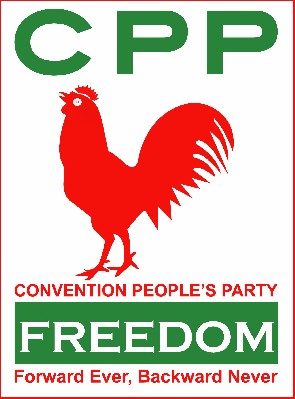Related Research Articles

Komla Agbeli Gbedemah was a Ghanaian politician and Minister for Finance in Ghana's Nkrumah government between 1954 and 1961. Known popularly as "Afro Gbede", he was an indigene of Anyako in the Volta Region of Ghana.

The Azanian People's Organisation (AZAPO) is a South African liberation movement and political party. The organisation's two student wings are the Azanian Students' Movement (AZASM) for high school learners and the other being for university level students called the Azanian Students' Convention (AZASCO), its women's wing is Imbeleko Women's Organisation, simply known as IMBELEKO. Its inspiration is drawn from the Black Consciousness Movement inspired philosophy of Black Consciousness developed by Steve Biko, Harry Nengwekhulu, Abram Onkgopotse Tiro, Vuyelwa Mashalaba and others, as well as Marxist Scientific Socialism.

The Convention People's Party (CPP) is a socialist political party in Ghana based on the ideas of the first President of Ghana, Kwame Nkrumah. The CPP was formed in June 1949 after Nkrumah broke away from the United Gold Coast Convention (UGCC).
The National Council of Nigeria and the Cameroons (NCNC) later changed to the National Convention of Nigerian Citizens, was a Nigerian nationalist political party from 1944 to 1966, during the period leading up to independence and immediately following independence.
Joseph Emmanuel Appiah, MP was a Ghanaian lawyer, politician and statesman.

Kow Nkensen Arkaah was a Ghanaian politician who was Vice-President of Ghana from 1993 to 1997. He was also a chief of Senya Beraku.
The United Party was the main opposition party in the First Republic of Ghana. It was the only opposition party throughout its existence from 1957 until 1964 when Ghana became a one party state.
The Ghana Congress Party was founded in May 1952 by Kofi Busia who also its leader. The party was formed by dissatisfied former Convention People's Party members, along with the United Gold Coast Convention (UGCC) and the National Democratic Party, which had both suffered poor performances in the 1951 elections, and soon dissolved. The party contested the 1954 election, winning one out of 104 seats. The party represented the conservative position of the chiefs and intelligentsia who were dominant in the UGCC.
The National Reconciliation Commission was established in January 2002 by the Parliament of Ghana. The goal of the commission was to establish an "accurate, complete and historical record of violations and abuses of human rights inflicted on persons by public institutions and holders of public office during periods of unconstitutional government." The Commission was formed after a new democratic party won the elections in 2000. The Commission covered human rights violations in Ghana from 1957 to 1993. It looked into government abuses and military coups staged by former president Jerry Rawlings. The members of the Commission worked until the end of 2004.

La France Insoumise is a left-wing populist political party in France, launched in 2016 by Jean-Luc Mélenchon, then a Member of the European Parliament (MEP) and former co-president of the Left Party (PG). It aims to implement the eco-socialist and democratic socialist programme L'Avenir en commun.
Bafuor Osei Akoto (1904-2002) was a Ghanaian agriculturalist, traditional ruler and politician. He was the founder and leader of the National Liberation Movement. He was a linguist of the Asantehene and resided in the Manhyia Palace 9 in Kumasi.
Bukari Kpegla Adama was a Ghanaian politician and a minister of state in the Second Republic.

The Korean National Youth Association abbreviated as Jokcheong was a neo-fascist, extreme right-wing group founded on October 9, 1946 under the catchphrase 'national branch, national geography', and led by Lee Beom-seok. KNYA had an ideology that intersected fascism and resistance nationalism, which also embraced left-wing youth and was described as a "Third Way". KNYA's fascism was deeply related to Third-Worldism (제3세계주의), which rejected both First World 'capitalism' and Second World 'communism'.
Akuamoa Ofosu-Boateng is a Ghanaian former politician and a member of the first and second parliament of the 4th republic of Ghana. He was a representative of the Lower west Akim Constituency in the Eastern Region and a member of the National Democratic Congress.
Anane Antwi-Kusi was a Ghanaian politician and member of the first parliament of the second republic of Ghana representing Tano constituency under the membership of the Progress Party.

Michael Kwasi Ossei was a Ghanaian politician and was a member of the first parliament of the second Republic of Ghana. He represented the Koforidua constituency under the membership of the Progress Party (PP).

The Political history of Ghana recounts the history of varying political systems that existed in Ghana during pre-colonial times, the colonial era and after independence. Pre-colonial Ghana was made up of several states and ethnic groups whose political system was categorized by 3 main administrative models; Centralized, Non-centralized and Theocratic states. In the colonial era, the British Empire employed different forms of government among its four territorial possessions in the Gold Coast. Indirect rule was implemented in the late 19th century after its success in Northern Nigeria. From the 1940s, native Ghanaians yearned for more autonomy. This resulted in the several constitutional reforms as well as the creation of the office of the Prime Minister in 1952.
William Ntoso was a Ghanaian politician who served in the Parliament of Ghana from 1957 until 1966, representing the Atebubu constituency.